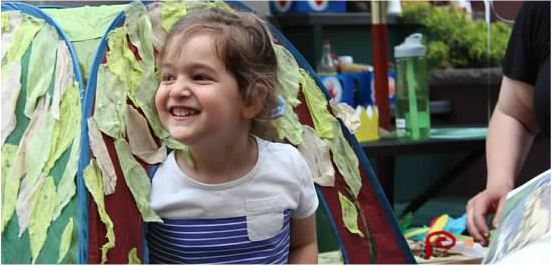 Sobha Kavanakudiyil, President of the Board of Directors for Spellbound Theatre and Faculty in the Graduate Program in Educational Theatre at The City College of New York. As a professor of Educational Theatre where we discuss Theatre for Young Audiences, I know the incredible value of theatre for children of all ages. Working with Spellbound Theatre has strengthened my commitment to teaching artists and educators on how to reach the youngest children through the power of live theatre. Last week, in my Theatre for Youth and Young Audiences graduate class at CCNY, I dedicated my entire class to Theatre for the Very Young, or Baby Theatre. For homework, I asked the candidates in the Graduate Program in Educational Theatre, to read two articles, Theatre from the Very Beginning by John Mack and Baby Theatre Comes of Age by Rob Weinert-Kent. Then, during our next session I asked the students to view a few minutes of performances of Baby Theatre including Spellbound Theatre’s amazing piece Wink. In class, we discussed what we noticed in each snippet and noted the importance of playfulness in works for the very young. We then listed the qualities we repeatedly saw in Theater for the Very Young: participation, sound, sight, experience, the frequency of wordless performance, non-traditional storytelling practices and staging, brevity (most pieces lasted no more than 30 minutes) and how the Pre-show and Post-show activities were almost part of the performance. . A pretty good list-- as their Professor I was proud. And then we had some fun. We created a list of possible themes that might be of interest to the very young: dreams, shadows, animals, numbers, nonsense, stars, and water. I then asked the class to break into groups and to choose one of these topics to explore, but they weren’t just to talk – they were to play. I had brought in props and fabric, and encouraged them to think outside of the classroom space and consider what else they might be able to bring in as these very short pieces (2 – 3 minutes) would not be performed until the following week. And then the most amazing thing happened. They just played. They laughed. They were creative. It was very much what we want to see the very young experience when they are part of the audience of Theatre for The Very Young. Research has shown that the arts help cognitive development, social development, and the use of imagination. Children become creative by introducing the arts. Innovation comes from the imagination. Why not encourage that as a priority and support that development early on? After all, to maintain global leadership wouldn’t these skills give the United States the edge if our children were encouraged to be creative? Lynne Kingsly writes for the Americans for the Arts blog: Vgotsky, an educational and developmental psychologist, theorized that imaginative play and creative activities allowed very young children to stretch their capabilities and learn to further their understanding of the world. Specifically, sensory and tactile experiences are beneficial to young children and babies in helping them develop understanding of the world around them and of relationships with other human beings. Theatre for the Very Young also encourages children to be patrons of the arts from the very beginning. At companies like Spellbound, children are being taken seriously as theatre-goers and as such works are created with consideration to their cognitive development. I think this can be attributed to the fact that many of the best practices in Theatre for the Very Young are grounded in Early Childhood Development. Works are created not only to entertain, but also to stimulate and to engage the senses beyond just the eyes. This aesthetic choice encourages artists to embed opportunity to touch, smell, taste, and hear a production; to develop multisensory opportunities for the audience who becomes ensconced in the world of the storytellers. Children then respond to these choices and feel ownership of the production as much as they enjoy it for its entertainment value. Spellbound Theatre not only creates opportunities for families to experience theatre together but also creates opportunities to explore the arts together and create imaginative and enthusiastic artists!
2 Comments
|
Authors
Lauren Jost, Director Archives
December 2017
Categories |
Spellbound Theatre
info@spellboundtheatre.com
info@spellboundtheatre.com


 RSS Feed
RSS Feed